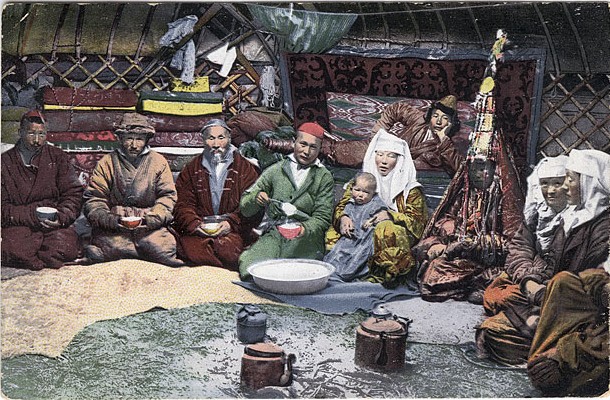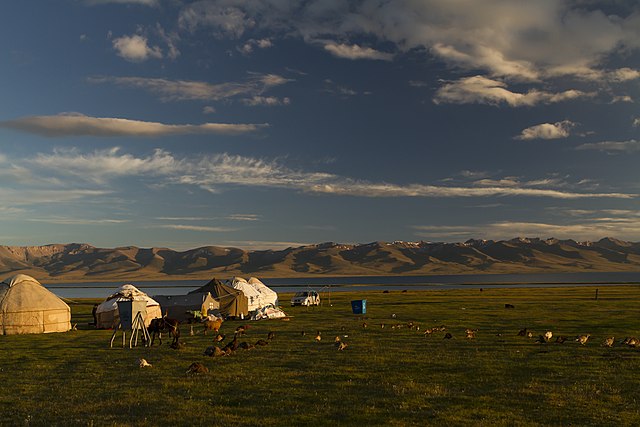From time immemorial, Kazakhs have been sensitive to their past and traditions. A respectful attitude to history was instilled in them through the knowledge of Zheti ata – Seven ancestors.
One of the most important and revered Kazakh traditions is called “Shezhire tuzu”, which means “Remember your roots”.
The Kazakhs have a proverb: “Ignorance of seven ancestors is a sign of orphanhood.” This is exactly what they said about people who could not name their ancestry.
Since ancient times, every nomad had to remember the names of grandfathers and great-grandfathers up to the 7th generation. This tradition has survived to this day and is called Zheti ata (Seven ancestors).

The memory of ancestors meant not only a tribute to them, but also care for their people. Relatives up to the seventh generation were considered close by the Kazakhs and were responsible for each other.
Also, the knowledge of seven ancestors helped to take care of the health of the nation and preserve its purity. This saved from incest and severe genetic diseases.
Any adult could ask a child if he or she knows his/her ancestors, so that he or she should without hesitation list the names of all grandfathers and great-grandfathers up to the seventh generation.
The Kazakh pedigree was compiled along the male line:
- Great-great-grandfather – Baba
- Great-grandfather – Ez ata
- Grandfather – Ata
- Father – Eke
- Son – Ul
- Grandson – Nemere
- Great-grandson – Shөbere
Shezhireshi – pedigree specialist
Previously, knowledge of zheti ata was the minimum requirement for every Kazakh. At the same time, there were special people – shezhireshi, who knew by heart the biographies, character, deeds of members of the clan. They were respected people who ensure the historical immortality of the people and possess huge layers of information necessary for the nation.
The origin of the Jeti ata tradition
It is difficult to say when the Kazakhs started a tradition of compiling their own genealogy. Now we only know that at the turn of the XVI-XVII centuries, one of the great rulers of the Kazakh Khanate, Yesim Khan, issued a decree that close relatives are strictly prohibited from entering into marriages on pain of death.
Thus, Yesim Khan contributed to the preservation of the gene pool of the Kazakh people. His decree, prohibiting marriages up to the seventh generation, was enshrined in the codes “Yesim original path” (“Esim khannyk eski zholy”) and in the code of laws of Tauke khan “Zhety Zhargy” (“Zheti Zhargy”).
How Kazakh families appeared

When the branch of the clan reached the seventh generation, the heads of the clan branch appealed to the elders of the clan with a request to recognize them as a separate clan. In such situations, the elders asked those who wanted to secede if they had their own bai, batyr and biy. That is, those people who could provide the clan financially, protect against attacks from enemies and represent members of the clan in judicial proceedings.
If there were bai, batyr and biy, then the allocation of a new Kazakh clan took place at a solemn ceremony with the participation of representatives of all three Kazakh zhuzes. From now on, members of the new clan had common livestock and property and were collectively responsible for each other.
Zheti ata in literature
The importance attached by the Kazakhs to Jeti ata is described in the poem of the famous writer Shakarim Kudaiberdiev “Kalkaman and Mamyr”.
It tells about the love between the batyr Kalkaman and the girl Mamyr. Being from the same clan tobykta and being each other’s second cousins, they could not be together. The young run away from the aul, and the elder brother Mamyr finds out about it, who is immediately overcome by anger.
After some time, the girl decides to come to her relatives with Kalkaman and ask for forgiveness, but at the entrance to the aul, the elder brother kills her with a bow shot and declares that he will not calm down until the same happens to the chosen one of her sister.
In response, the council of elders decrees that Kalkaman will be released if he passes the test. Batyr must ride a horse in front of Mamyr’s brother, while he will shoot him with a bow. If the arrow does not touch the batyr, he will be free. As a result, the girl’s relative misses, and Kalkaman leaves his native village forever.
Jeti ata in modern Kazakhstan
After Kazakhstan joined the Russian Empire, the “Zhety Zargy” laws became invalid. In modern legislation, there is also no prohibition of marriage up to the seventh generation, there is only a prohibition on the union between siblings. However, despite this, parents try to instill in their children knowledge about their ancestors.
In 2020, the Ministry of Culture and Sports of Kazakhstan proposed to celebrate the Nauryz spring holiday for 10 days from March 14 to 23. Moreover, each day has its own name.
Thus, March 16 became the Day of Remembrance of Ancestors (Shezhire kuni). On this day, people cook Kazakh national dishes, read prayers in memory of their departed ancestors.
The older generation tells the descendants about good deeds and interesting moments from the life of ancestors, relatives, about the history of the family and zheti ata.


